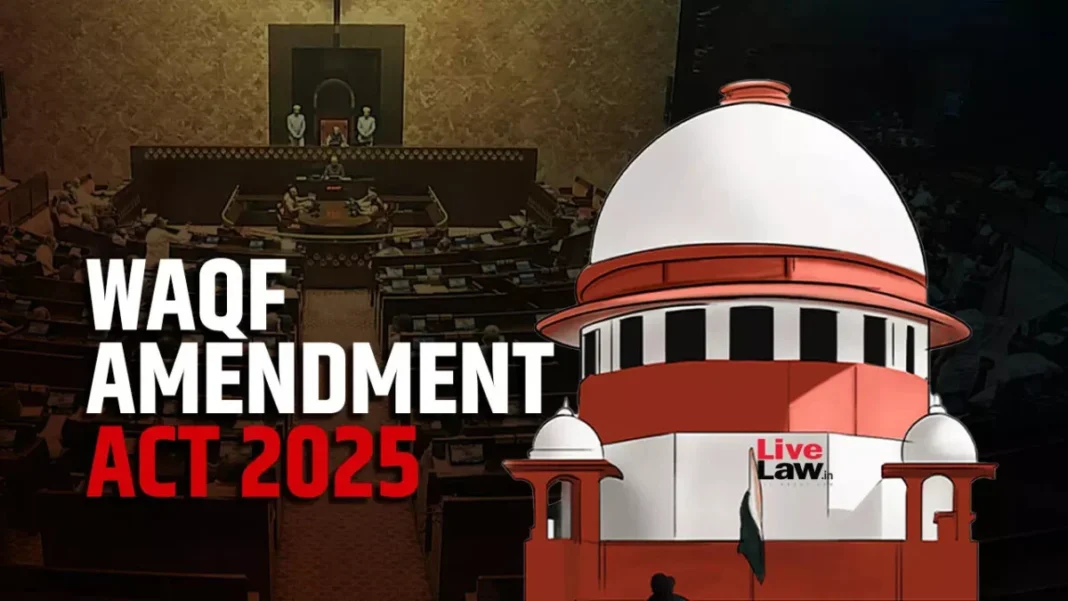As SC prepares to hear Waqf amendment challenge, activists allege state defiance and legal silence
By Anwarulhaq Baig
New Delhi:As the Supreme Court gears up to hear pleas challenging the controversial Waqf (Amendment) Act, 2025 on May 20, alarming reports continue to emerge from Uttar Pradesh and Uttarakhand: dozens of mosques, madrasas, dargahs, and Eidgahs—protected under Islamic charitable endowment laws—are being demolished or forcibly shut down despite explicit Supreme Court assurances to the contrary.
According to activist Ahmed Jawed, founder of WaqfToday.live, at least 225 madrasas, 30 mosques, 25 dargahs, and 6 Eidgahs have been targeted so far, in what he calls a “systematic campaign to erase Muslim religious heritage.” Demolitions reportedly continued as recently as this week in Maharajganj, Saraswati, and Bahraich districts of Uttar Pradesh.
“It was a tragic and shameful scene in the Supreme Court today,” Jawed told this reporter on Thursday. “The legal team representing the Muslim petitioners failed to raise a single word about these ongoing demolitions. Meanwhile, the Hindu side spoke forcefully in favor of the government’s stance.”
Jawed was referring to the Supreme Court hearing on May 16, where a two-judge bench led by newly sworn-in Chief Justice of India BR Gavai and Justice AG Masih said it would hear only three issues related to interim relief on May 20:
-
The removal of “waqf by user” from the statutory definition.
-
The provision allowing non-Muslims to be nominated to Waqf Boards and the Central Waqf Council.
-
The government’s power to declare public land as waqf property.
SC Draws a Line: 1995 Act Not Up for Debate
During the hearing, CJI Gavai clarified that the Court would not entertain any challenge to the original Waqf Act of 1995, reiterating that the current proceedings were strictly limited to the 2025 amendments.
“We will not consider any request for a stay on the provisions of the 1995 Act. Just because someone is trying to challenge the 2025 Act, they cannot use this as a backdoor to question the 1995 Act,” the Chief Justice remarked firmly.
Legal Silence on Demolitions Sparks Backlash
Jawed sharply criticized the legal team representing Muslim petitioners, including Advocate Ejaz Maqbool, the coordinating counsel, for failing to highlight what he calls “blatant contempt” of the Court’s interim directions.
“While the Solicitor General gave written assurances to the bench that no adverse action will be taken in the interim, the ground reality is starkly different,” Jawed said. “Religious sites are being razed, and the community’s silence in court is enabling it.”
Solicitor General Assures Status Quo — But Demolitions Tell a Different Story
Solicitor General Tushar Mehta, appearing for the Union government, submitted a detailed note assuring the Court that:
-
Properties declared as waqf by courts will not be de-notified, regardless of whether they fall under “waqf by deed” or “waqf by user.”
-
The government will not enforce the new provision allowing it to conduct inquiries into land status during the pendency of the case.
-
All members of the Waqf Boards and Central Waqf Council will remain Muslim, except for ex-officio members.
However, activists argue these promises ring hollow in light of ongoing demolitions — especially as most of the affected properties are centuries old religious sites historically categorized as “waqf by user,” now stripped of legal recognition by the 2025 amendment.
High Stakes: Petitioners Warn of Heritage Loss
Appearing for the petitioners, Senior Advocate Kapil Sibal emphasized that removing the doctrine of “waqf by user” would endanger countless undocumented religious sites, such as mosques, dargahs, and graveyards that lack formal deeds but have been used for worship for generations.
“It’s practically impossible to prove religious usage from centuries ago in the absence of documentation,” Sibal told the Court.
Other prominent lawyers representing the petitioners include Rajeev Dhavan, Abhishek Manu Singhvi, Huzefa Ahmadi, and CU Singh.
Over 20 petitioners, including the All India Muslim Personal Law Board, AIMIM MP Asaduddin Owaisi, Jamaat-e-Islami Hind, Jamiat Ulama-i-Hind, APCR, and civil society organizations, have challenged the 2025 Act, calling it discriminatory and a violation of Muslims’ constitutional right to manage their religious institutions under Article 26.
Right-Wing Push to Expand the Case Denied
During Thursday’s hearing, Hindu right-wing lawyer Advocate Vishnu Shankar attempted to steer the debate toward the original 1995 Act, citing pending petitions in multiple High Courts and questioning the constitutionality of Waqf Tribunals and waqf tax exemptions.
But the Chief Justice was unyielding.
“You cannot raise challenges to the 1995 Act in a matter concerning the 2025 Amendment,” CJI Gavai stated.
Political and Legal Backdrop
The Waqf (Amendment) Act, 2025, passed in early April by the BJP-led Parliament and signed into law on April 5, seeks to drastically alter the regulatory framework for managing Islamic charitable endowments.
Six BJP-ruled states — Uttar Pradesh, Maharashtra, Madhya Pradesh, Rajasthan, Chhattisgarh, and Assam — have filed intervention applications in support of the Act, calling it a much-needed reform.
Looking Ahead: May 20 Hearing Crucial
The Supreme Court has set aside May 20 exclusively for hearing arguments on interim relief. Both sides must file concise written submissions by May 19, and each has been allotted two hours for oral arguments.
With CJI BR Gavai, the first Buddhist Chief Justice of India, now at the helm, legal analysts are expecting a focused and possibly precedent-setting discussion.
“No other matters will be taken up that day,” the Court has declared. “All parties must come fully prepared.”
As the legal battle continues inside the courtroom, the fate of hundreds of religious properties outside it hangs in the balance—demolished, displaced, or under threat, despite the highest court’s ongoing scrutiny.

